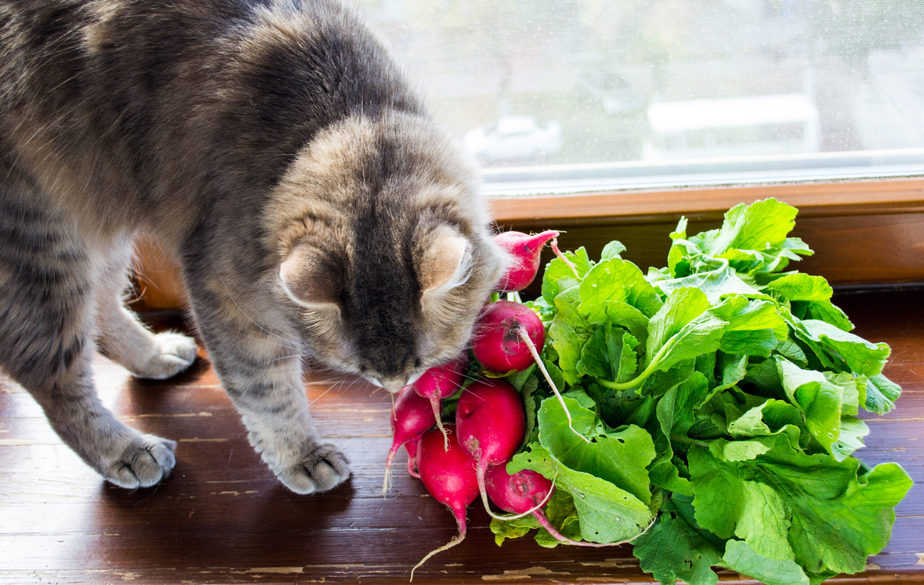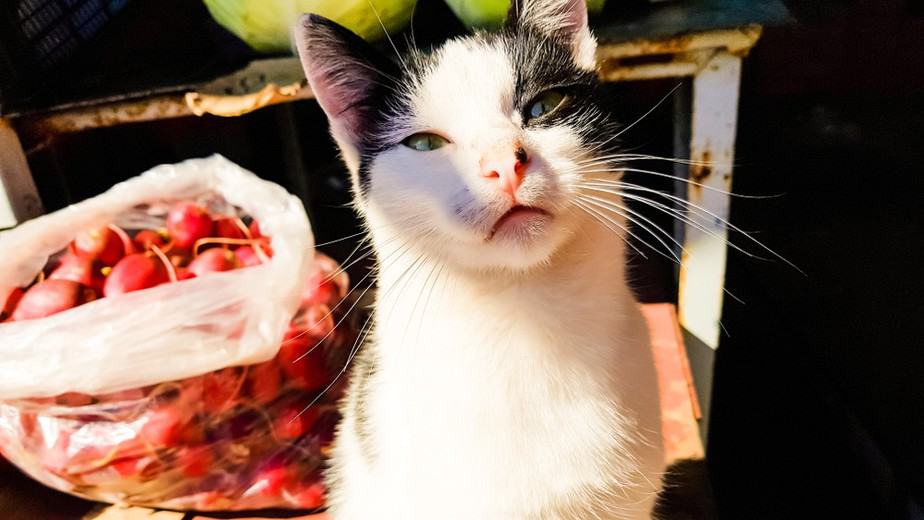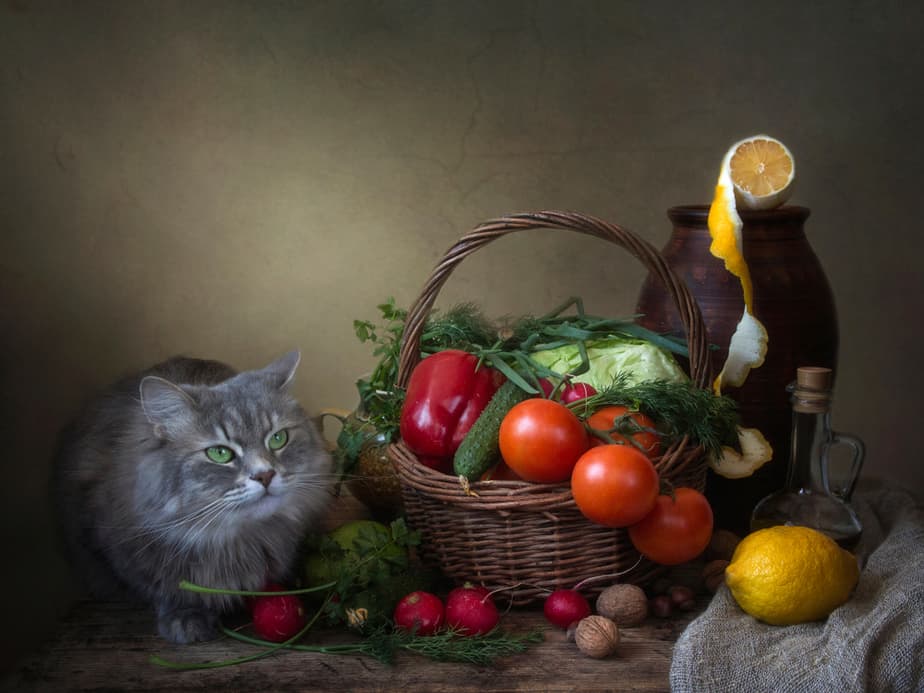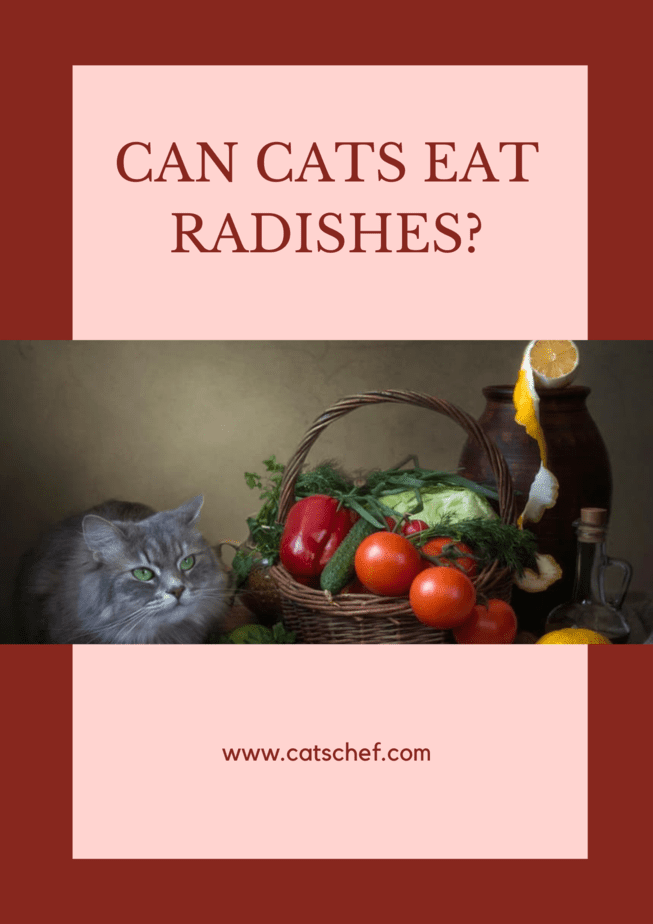📖 Table of Content:
Every now and then, your cat can munch down on some veggies. Despite being carnivores, an occasional vegetable snack can bring them some refreshment. Certain foods offer health benefits while others could have adverse effects. This is where the question “Can cats eat radishes?” comes to mind.
Cat owners want to provide their furballs with the best care possible. This means incorporating healthy foods to maintain a healthy and balanced diet. Our lap monsters are unable to synthesize all the needed nutrients like their wild cousins.
That’s where we step in. To enrich your cat’s diet and better the overall quality of her life, you first need to understand the feline body. They are wired for meat consumption and dependent on it. If you’re looking to include radishes as a substitute for her main choice of food, take a big step back.
Can cats eat radishes safely?
Cats can eat radishes in small amounts. This vegetable isn’t proven to be toxic to felines, but on the other hand, there’s no proof of it being a necessary part of their diet. This edible root shouldn’t worry you if your pet gets a hold of it.
Also, the fiber it contains may help with weight loss and diabetes management. Since fiber is indigestible, it loads the stomach without supplying calories, allowing your cat to feel satisfied while consuming fewer calories.
High-fiber foods can make your cat feel physically full without consuming extra energy, which can help battle their tendency to overeat.
Having a curious cat and a lush garden can be a downer. At least, you won’t have to worry about your furkid digging up the radishes. As for other plants and vegetables, you’re on your own.
Jokes aside, radishes aren’t harmful to cats, but some symptoms could occur after their ingestion.
What about radish greens?
Unlike other vegetables’ leaves that could be poisonous to your cat (e.g. eggplant leaves), the leaves of radishes aren’t a reason for concern. There are no chemicals compounds found in the leaves that pose a threat to your cat’s health.
Still, there shouldn’t be a reason for your pet to eat radish leaves unless she’s just one of those insatiable little pests. What can we say, sometimes their curiosity will get the best of them!
Are there any health benefits?
Let’s not forget about the vital antioxidants contained in radishes. They aid in the prevention of oxidative damage to cells. Carotenoids present in this vegetable include lycopene, beta carotene, lutein, and zeaxanthin.
Lutein, for example, helps to prevent cataracts, a condition in which your cat’s eye lens becomes clouded. As a result, these antioxidants aid in the improvement of your pet’s vision.
Unfortunately, this isn’t a reason enough to feed your cat radishes. Sure, she can have some, but it won’t benefit her immediately. Radishes have a decent nutritional value, but not enough for them to be a staple in your pet’s diet.
These root vegetables are high in vitamins such as vitamin C, folate, riboflavin, and niacin. Certain minerals like potassium and calcium can be found in radishes as well.
However, many other vegetables could serve a greater purpose to your furkid like lettuce or bell peppers, for example. If she decides to have a nibble of your salad which contains radishes, that’s okay.
Furthermore, because radishes are high in fiber, their consumption could reflect badly on your cat’s health. Dietary fiber, in small amounts, helps your pet’s digestion. But, large quantities of this nutrient can have a bad impact on her digestive tract and cause constipation.
Oh, the irony with this food. Well, what can you do? We know, stick to the meat!
What’s the catch?
Radishes have poor nutritional value and shouldn’t be incorporated into your cat’s main diet.
Avoid giving your cat radishes, even if they have all of the vitamins and minerals listed above. Your cat isn’t poisoned by these root vegetables, but she can’t digest plant-based foods adequately.
Constipation, diarrhea, and even vomiting are all symptoms of improper digestion in cats. If your pet can’t digest food, she won’t obtain any of the nutrients she needs.
So, while cats can eat radishes since they don’t harm them, they can’t digest them properly. Food that hasn’t been digested will then cause digestive issues and nutrient loss.
Besides, if your furkid is a greedy one and tries to gulp down the whole radish, you better intervene. Cats will sometimes badly misjudge their abilities. Whole radishes can be a choking hazard if your pet decides to put on her smarty pants and tries to go for it.
Lack of protein
Felines require a daily protein supply and must consume it on a consistent basis. It helps carnivores in a variety of ways, including boosting their immunity and keeping their nervous systems in good shape.
Protein is the most important factor in your cat’s general health and well-being. Your cat will lose weight, muscular mass, and become feeble if she doesn’t eat enough protein. She’s built to digest animal-derived proteins better than the plant-derived ones because she’s a carnivore.
Vitamins, amino acids, and fatty acids are all contained in animal protein sources that aren’t found in plant protein sources. Cats are unable to produce as many amino acids and vitamins as dogs or humans, rendering them completely reliant on animal protein sources for essential requirements.
Taurine is an important amino acid that isn’t present in plants and is essential for proper kidney and heart function. Your feline friend might be facing some serious health issues if she doesn’t ingest enough of these amino acids.
Can cats eat radish microgreens?
These aren’t poisonous to felines, which is good news for outdoor cats. If she’s been lurking behind the corner and waiting for the first opportunity to grab those radishes, you don’t have to panic.
However, there’s really no need to feed your cat these, as they can’t provide her with all the necessary health supplements. If you’re looking to incorporate more greens into your pet’s diet, go for some green or red peppers!
The truth behind cats eating radishes
The only actual advantage of radishes for cats is the fiber content. They do not provide any other nutrients in a form that your cat can digest.
Cats must obtain the majority of their calories and nutrients from meat since they are obligate carnivores. While some vegetables can be beneficial to cats in some circumstances, they should be limited in their diet.
Cats have a tougher time digesting some veggies, such as radishes. So, while these may be a healthy option for you, they may not be for your cat. The majority of your cat’s vegetable and fruit requirements are met by their cat food, whether kibble or wet food.
Because the pet food market lacks numerous standards and control, certain brands may include too much vegetable, fruit, and grain in some of their products.
If you don’t prepare your cat’s food yourself, check to see how much vegetable content is already included in their current meal. Vegetables should only be a tiny part of your cat’s diet, or a special treat.
It’s also vital not to force-feed your cat any foods unless it’s a meal or supplement that your vet has specifically recommended. If your cat isn’t fond of a certain food, don’t force it.
Radish allergy
As if you don’t have enough on your mind with these crazy floofs! Just like humans, cats can develop certain allergies. They can either be born with it or develop it throughout the course of the years. Another option with radish allergy is that your pet will outgrow it once she reaches adulthood.
You never know if your cat is allergic until you actually notice it. Chicken, wheat, fish, and corn are some of the foods that can trigger allergies. Stomach sensitivity and skin itching are two symptoms of an allergic reaction.
Anaphylaxis, which can be life-threatening, can also occur in rare circumstances. However, it’s very rare for cats to have radish allergies.
Besides, the pungent, almost peppery flavor isn’t really attractive to felines. Their sense of smell is far better than ours and therefore, it may be more sensitive to certain flavors.
Just as is the case with black pepper and human sneezes, maybe radishes could be a natural cat repellent.
To sum up
One last time – can cats eat radishes? The answer is: They can but it isn’t recommended. These vegetables aren’t poisonous to felines, but they aren’t too beneficial either. Low nutritional value isn’t good for them, especially without any protein.
Felines are obligate carnivores which means they rely solely on protein intake, and radishes have none of it. If your cat decides to nibble down some radishes, it’s fine. But, don’t make this vegetable a staple in your cat’s diet.
If you notice any changes on her skin, it’s possible she’s having an allergic reaction to radishes, although that only happens in very rare cases.
Up next: Can Cats Eat Asparagus? Superfood Or Super Rude To Cats?





